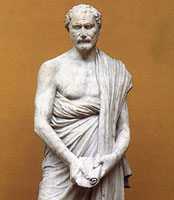http://savalas.tv / about / country / greece /
Demosthenes Famous Funeral Speech
Demosthenes (384-322 BC), orator at Athens, was a pleader in law courts who later became also a statesman, champion of the past greatness of his city and the present resistance of Greece to the rise of Philip of Macedon to supremacy. We possess by him political speeches and law-court speeches composed for parties in private cases and political cases. His early reputation as the best of Greek orators rests on his steadfastness of purpose, his sincerity, his clear and pungent argument, and his severe control of language. In his law cases he is the advocate, in his political speeches a castigator not of his opponents but of their politics.
Compare to the Gettysburg Address by Abraham Lincoln, November 19, 1863
Demosthenes Funeral Speech, delivered around 330 B. C.
"After the State decreed that those who repose in this tomb, having acquitted themselves as brave men in the war, should have a public funeral, and appointed me to the duty of delivering over them the customary speech, I began straightway to study how they might receive their due tribute of praise; but as I studied and searched my mind the conclusion forced itself upon me that to speak as these dead deserve was one of those things that cannot be done.
For, since they scorned the love of life that is inborn in all men and chose rather to die nobly than to live and look upon Greece in misfortune, how can they have failed to leave behind them a record of valor surpassing all power of words to express.
Nevertheless I propose to treat the theme in the same vein as those who have previously spoken in this place from time to time.
That the State seriously concerns itself with those who die in battle, it is possible to infer both from these rites in general and, in particular, from this law, in accordance with which it chooses the speaker at our public funerals.
For knowing that among good men the acquisition of wealth and the enjoyment of the pleasures that go with living are scorned, and that their whole desire is for virtue and words of praise, the citizens were of the opinion that we ought to honor them with such eulogies as would most certainly secure them in death the glory they had won while living."


 Donations & Payments
Donations & Payments Savalas.TV Audio Logo
Savalas.TV Audio Logo Savalas.TV RSS Feed
Savalas.TV RSS Feed Savalas.TV Sitemap
Savalas.TV Sitemap Accessibility Help
Accessibility Help Close-Captioned Media
Close-Captioned Media













